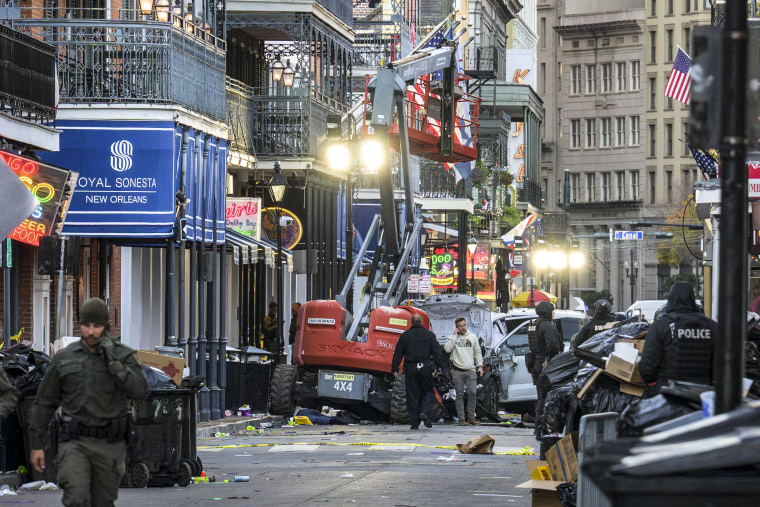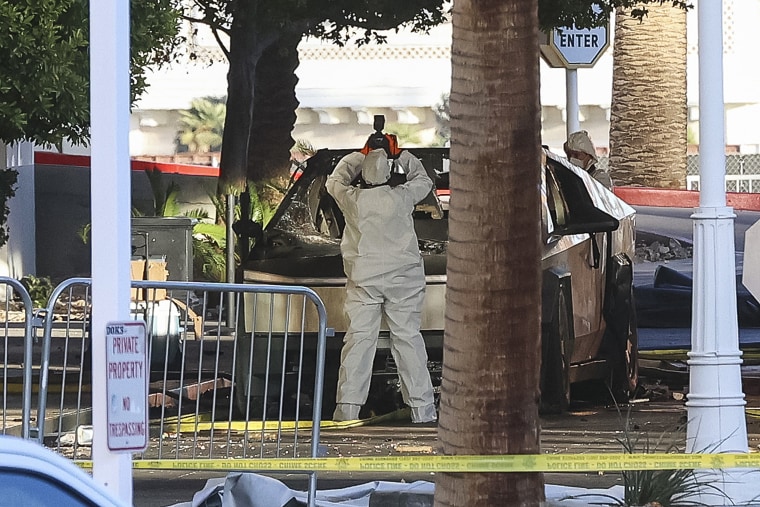Authorities said Thursday they have found "no definitive link" between the New Orleans attack on New Year's Day and the explosion in a Tesla Cybertruck outside a Trump hotel in Las Vegas.
“At this point, there is no definitive link between the attack here in New Orleans and the one in Las Vegas,” Chris Raia, the deputy assistant director of the FBI’s counterterrorism division, said at a news conference in New Orleans.
The potential link was just one thread being pulled by officials who were also searching a site in Texas on Thursday, a day after a man drove a pick-up truck flying an ISIS flag into New Orleans’ busy Bourbon Street in the early hours of New Year’s Day, killing 14 people and injuring at least 30 others.
Follow along for live coverage

Hours after the New Orleans attack, the Las Vegas explosion triggered heightened security around Trump towers in New York and Chicago. Tesla CEO Elon Musk is a top adviser to President-elect Donald Trump, who is set to take office later this month.
President Joe Biden said Wednesday that “law enforcement and the intelligence community” were investigating “whether there’s any possible connection” between the incidents.
New Orleans suspect Shamsud-Din Jabbar, 42, who died in a subsequent gunfight with police, was a U.S. national, a Texas resident and an Army veteran. He worked in the military’s human resources and information technology departments from 2006 to 2020, including a deployment to Afghanistan in 2009.
Matthew Alan Livelsberger, the man who died in the Las Vegas Trump tower blast, also had military experience, two law enforcement sources familiar with the investigation said.
He entered the Army in 2006, re-entered active duty in December 2012 and climbed the ranks to become a Green Beret candidate after serving in the National Guard and the Army Reserve, according to a spokesperson.
Both vehicles were rented from the same company, Turo, and officials are looking into whether there is a link on that front. Turo said it was “actively partnering with law enforcement authorities as they investigate both incidents.”

In New Orleans, it should have been a night of celebration on one of the country’s most famous party streets, a popular tourist area in the French Quarter filled with bars and restaurants. Around 3:15 a.m. however, it became a scene of horror, with witnesses and social media videos describing bloodied, mangled bodies strewn over the road as the truck raced down the street before crashing.
“This man was trying to run over as many people as he possibly could,” Police Superintendent Anne Kirkpatrick said at a news conference. “He was hell bent on creating the carnage and the damage that he did.”
As details continued to emerge about the victims, and mourners flocked to the scene to lay flowers, questions were raised about how the driver was able to get around barriers designed to keep pedestrians safe.
Mayor LaToya Cantrell said bollards were not up because they were still under construction. She said the project was nearly finished, with completion expected before New Orleans hosts the Super Bowl in February.
Jabbar lived in Texas, and later Wednesday the Harris County Sheriff’s Office said it was conducting a court-authorized search of a location in Houston, an operation involving an FBI SWAT team, negotiators, bomb technicians and a group of counterterrorism investigators.
No arrested had been made, FBI Houston said in an update late Wednesday.
Murrill, the Louisiana attorney general, told NBC News that investigators suspected that explosive devices associated with the New Orleans attack were made in an Airbnb in the city rented by those involved. A potential improvised explosive device was in the truck, and other potential IEDs were discovered in the French Quarter, the FBI said.
Meanwhile, the Sugar Bowl college football game between Georgia and Notre Dame is expected to go ahead Thursday at the Superdome in New Orleans, after it was rescheduled from Wednesday evening.


